Unit 31: Improving Special Needs Daycare with Early Intervention
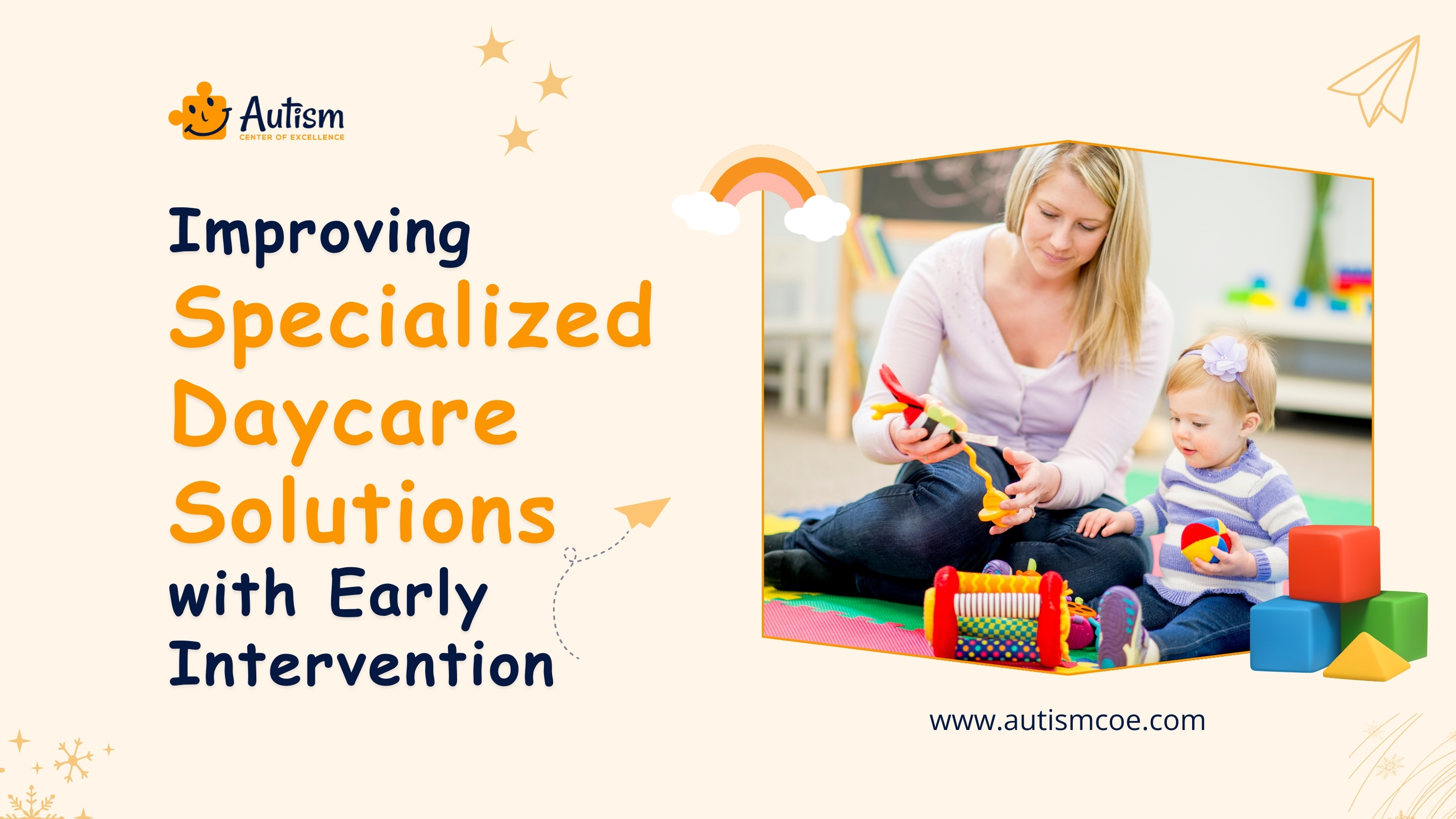
It is a kind of place where every child is provided with the care that they require to grow, learn, and be who they are. That is the whole idea behind Special Needs Daycare! Specialized daycare is like the hidden gold for parents of children with autism. It is not only a place where a child can play and learn but a place where the child is valued as a person with special abilities and needs. This is where the magic of Early Intervention comes in.
Early intervention is like giving kids a head start on their journey—especially for toddlers in daycare settings. It is about giving the necessary care and assistance at an early age in order for the kids to develop and reach developmental milestones in their unique manner. These interventions are also included in the special daycare services so that children are given a safe environment. When we say that special needs daycare is essential, we are stressing the need to allow every child the opportunity to be the best they can be. So, let’s go straight to how enhancing these daycares through Early Intervention will help the little ones and their families!
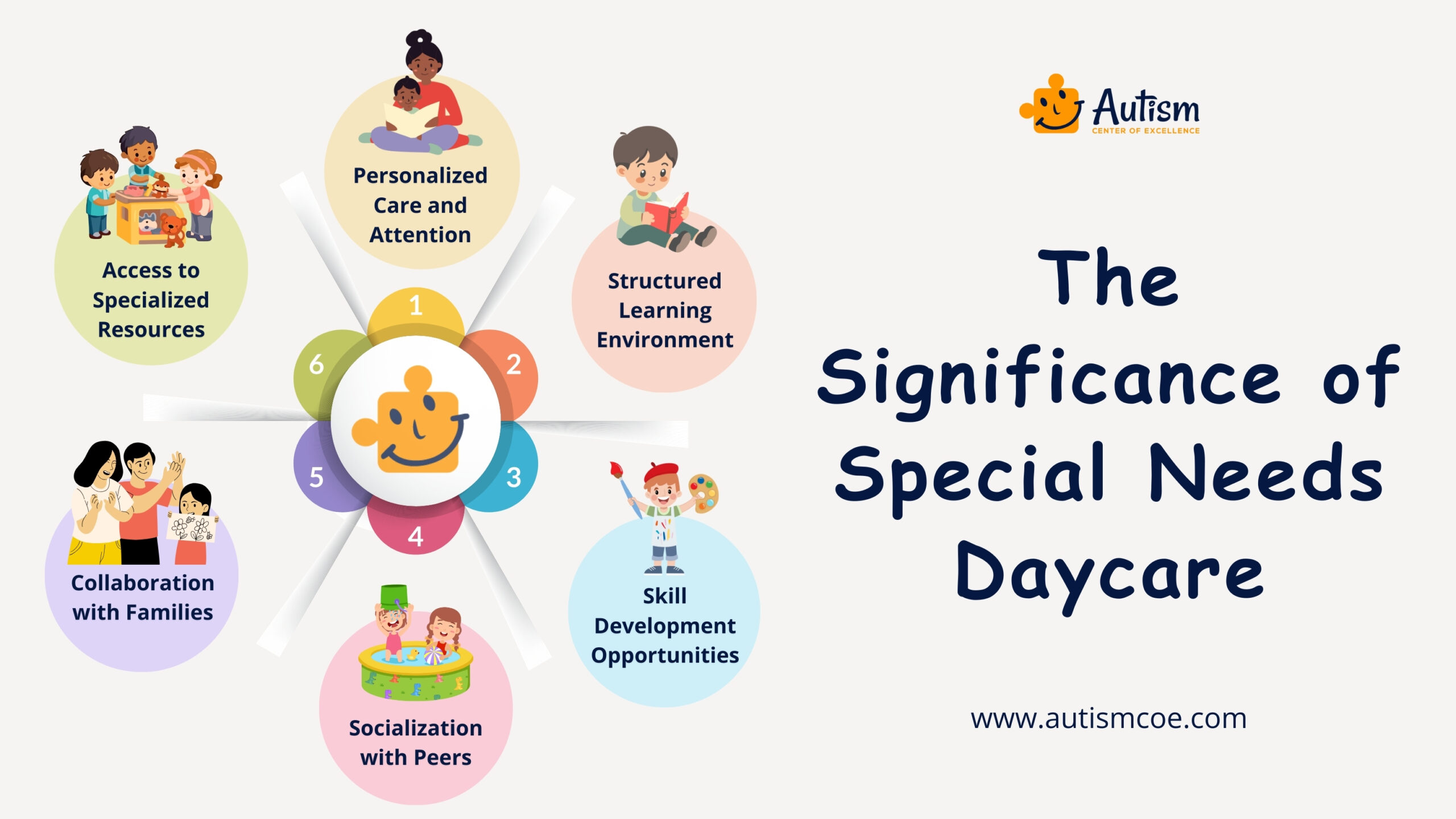
Importance of Special Needs Daycare
Daycare for children with learning difficulties should be made available because children need to be given an opportunity to discover themselves and the world in the future.
Personalized Care and Attention
In special needs daycare, every child is given attention that meets the child’s individual needs. Caregivers understand the unique needs of every toddler, ensuring they feel valued and supported.
Structured Learning Environment
Special needs daycare programs develop a good structure in which children can grow and perform well. This builds up routines that are very important in the learning and development of children.
Skill Development Opportunities
The specialized daycare provides different activities designed to foster skill acquisition, including social skills and Motor Skills. It also ensures that children become more confident and can manage themselves on a given task.
Socialization with Peers
When toddlers are in a similar setting, they are able to learn how to interact with other children and share their experiences. This social aspect is very important for their emotional development and well-being.
Collaboration with Families
Daycares for special needs share working relationships with families to ensure that the care given resembles the home care style and objectives. This collaboration helps foster a harmonious environment within the child so as to ensure that they are supported.
Access to Specialized Resources
Such daycares can have access to instruments and materials that are aimed at helping kids with autism. The above resources enhance learning and participation.
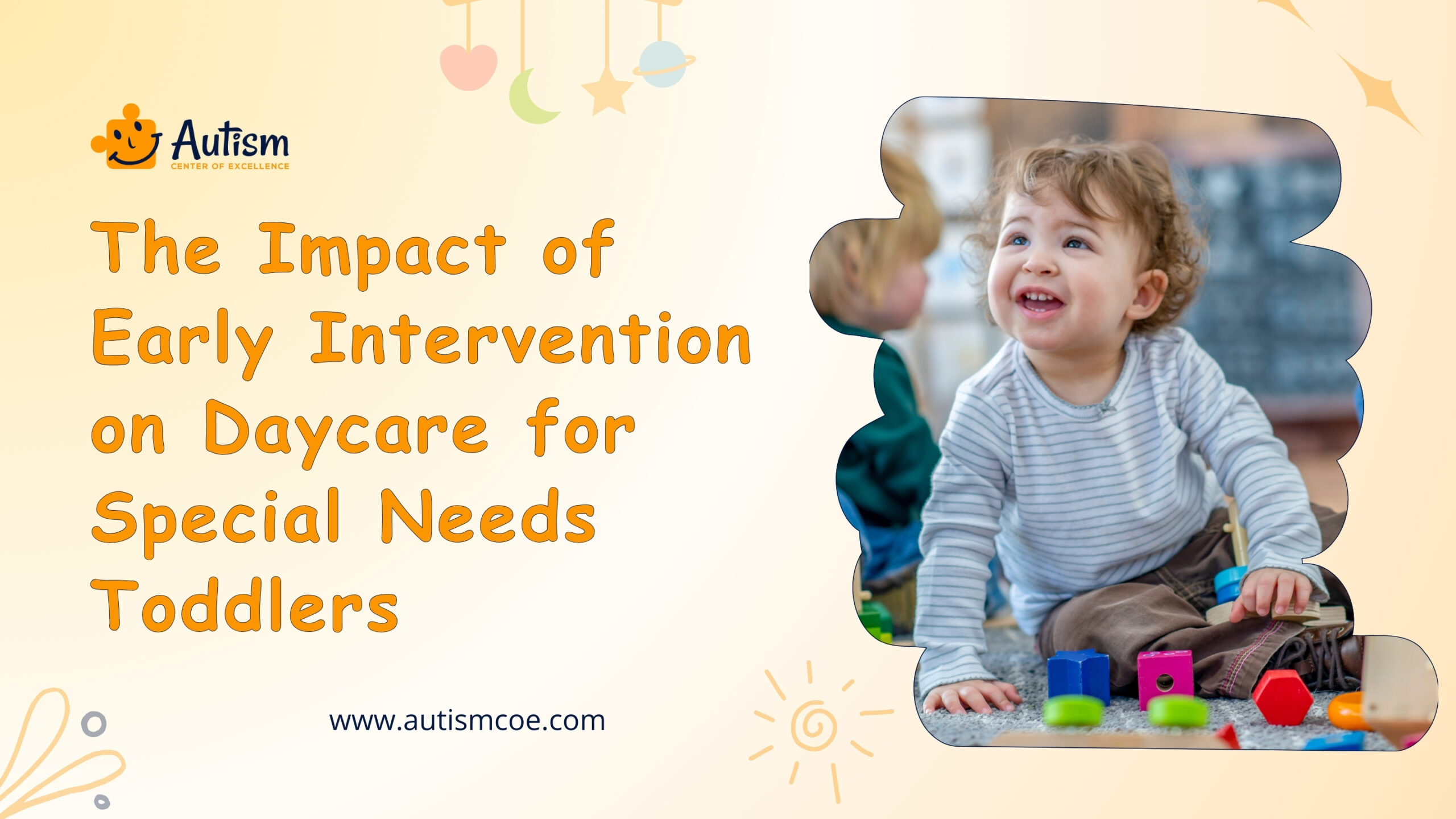
Early Intervention’s Impact on Daycare for Special Needs Toddlers
If you ask special needs daycares what early intervention is like, they may tell you that it is like the magic box of tools that allows toddlers to turn their daycare centers into places of infinite possibilities. When these strategies are introduced, they change daycares to places where all children can develop to their full potential. Think about it: every activity that is organized, from playing time to story time, is aimed at the development of toddlers in their potential.
For toddlers with special needs, early intervention in daycare settings is crucial for building the foundation of their future. It offers tailored support through specialized therapies such as speech and Occupational Therapy, helping them develop essential skills like communication and motor abilities. These strategies foster warmth and positive regard, which enables toddlers to feel secure and supported to try out new things. With early intervention, special needs daycares are transformed into active spaces where each child can enjoy the processes of learning and development as well as celebrate their successes, which creates hope for the future.
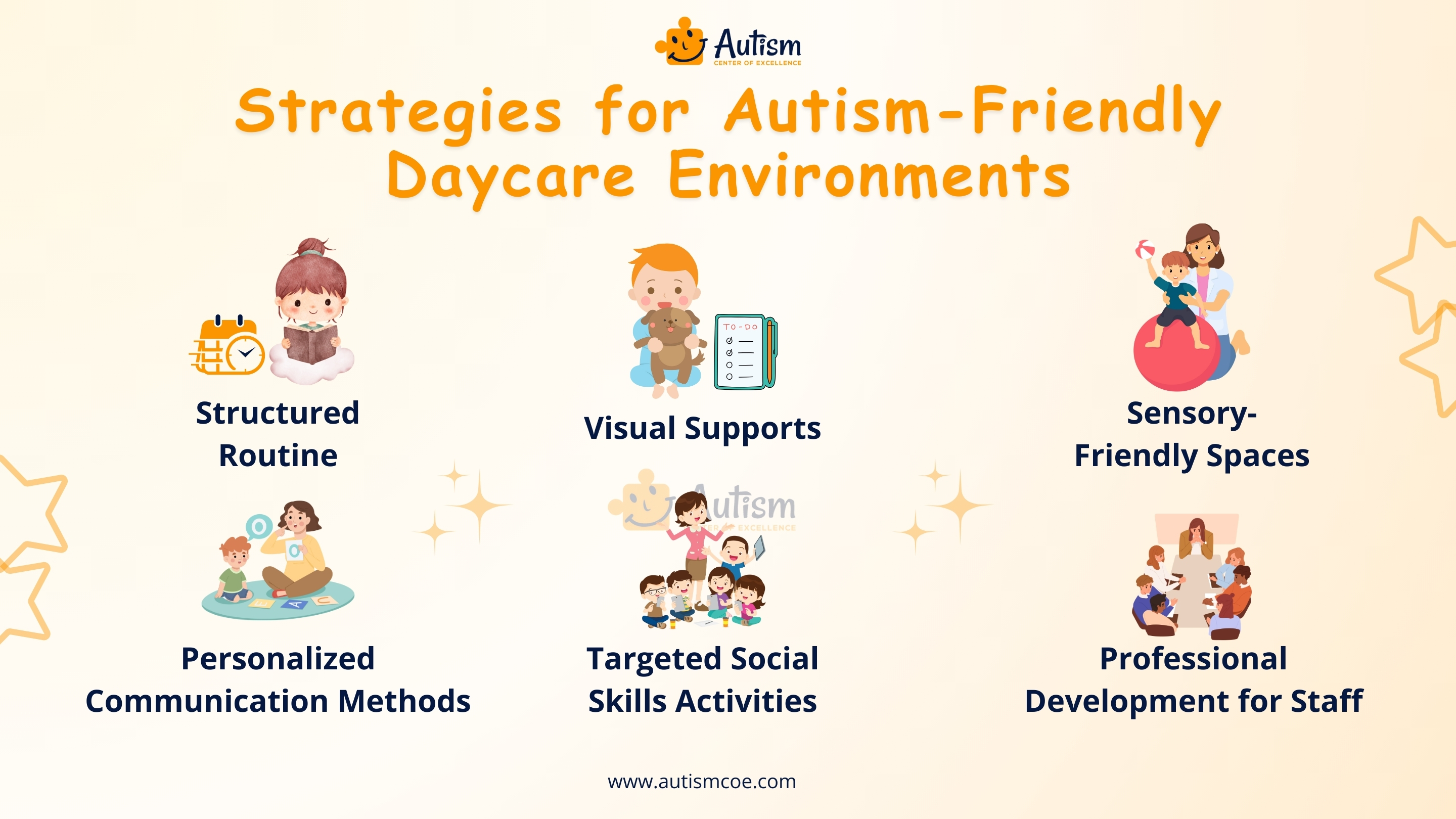
Early Intervention Strategies for Autism Daycare Programs
Making an autism-friendly daycare facility is like constructing a unique play area to make every child comfortable and cheerful. Care is given to Children with Autism, and such children are encouraged to learn at their own pace in the facility. Here are some strategies that can help autism daycare centers become more welcoming for children:
Structured Routine
Stability is important to children with autism, and maintaining a routine each day will make them feel secure. They clearly understand what they should find when they get to that area, and they are also prepared for the next activity.
Visual Supports
Include pictures, charts, or symbols to illustrate the daily schedule or any instructions. For children who learn in pictures, a graphic display can be very useful.
Sensory-Friendly Spaces
Designate certain zones that children can run to when they need to avoid loud sounds or bright lights. They afford comfort and a good place to relax.
Personalized Communication Methods
Learn the child’s communication style if the child uses sign language, picture exchange, or gestures and uses it all the time.
Targeted Social Skills Activities
Introduce Games and Activities that will enable the child or children involved to learn how to communicate as well as to cooperate with their peers.
Professional Development for Staff
Make sure that all the staff working in a daycare facility have adequate information about how to handle children with autism. This enables them to have adequate knowledge of how they can meet each child’s needs, depending on the situation.
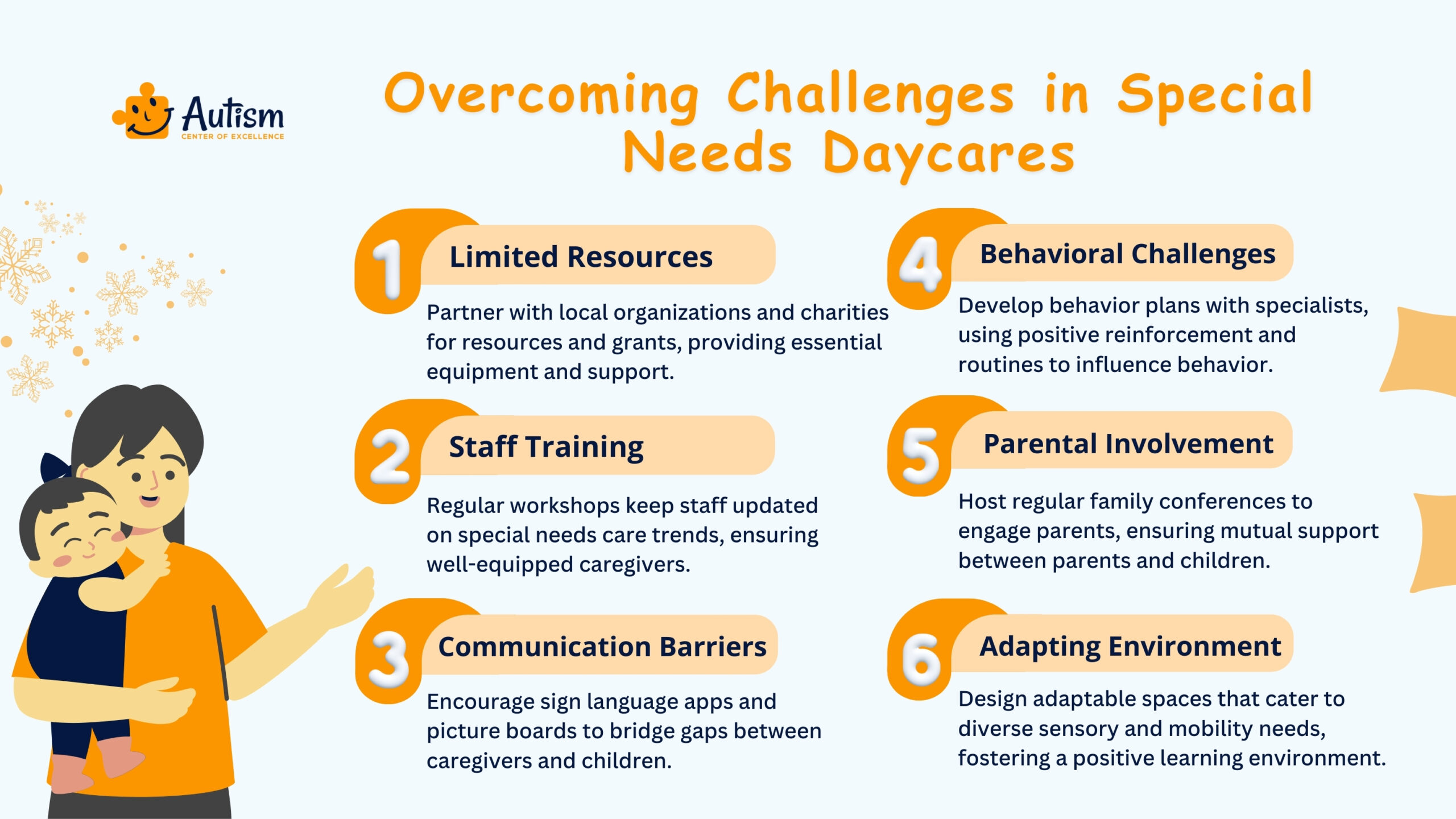
Challenges in Special Needs Daycares and How to Overcome Them
Special needs daycares can expand their service delivery by ensuring that they promote care that fosters the growth of each child. This can be done by developing individual care plans for children, hiring qualified personnel who know certain teaching and developmental intervention methods for children with disabilities, and using assistive technology.
1️⃣ Limited Resources: Engage local organizations and charities to obtain other resources and grants to support the program. Such partnerships can offer daycares essential equipment and some help.
2️⃣ Staff Training: Ensure that the staff members attend workshops and training sessions as often as possible to ensure that they are up to date with the current trends in caring for special needs children. This makes sure that the caregivers are well-equipped to deal with different circumstances and provide the best care.
3️⃣ Communication Barriers: Children can be encouraged to use applications in sign language or picture boards while communicating. Promoting individual approaches can contribute to the elimination of the distances between caregivers and children.
4️⃣ Behavioral Challenges: Use the behavior plans developed in collaboration with specialists for students. These plans should rely on Positive Reinforcement and routines in order to influence behavior appropriately.
5️⃣ Parental Involvement: Conduct daily and weekly family conferences and seminars to ensure the involvement of the parents. This way, both the parents and the child agree, and the parents are in a position to support the child, and the child is in a position to support the parents.
6️⃣ Adapting the Environment: Create spaces for learning and play that may be easily changed to accommodate various children’s sensory and mobility profiles. This adaptability will help provide a favorable learning environment for all young children.
Enjoying Reading?
Join Our Weekly Newsletters!
Subscribe now to stay updated with our latest email updates.
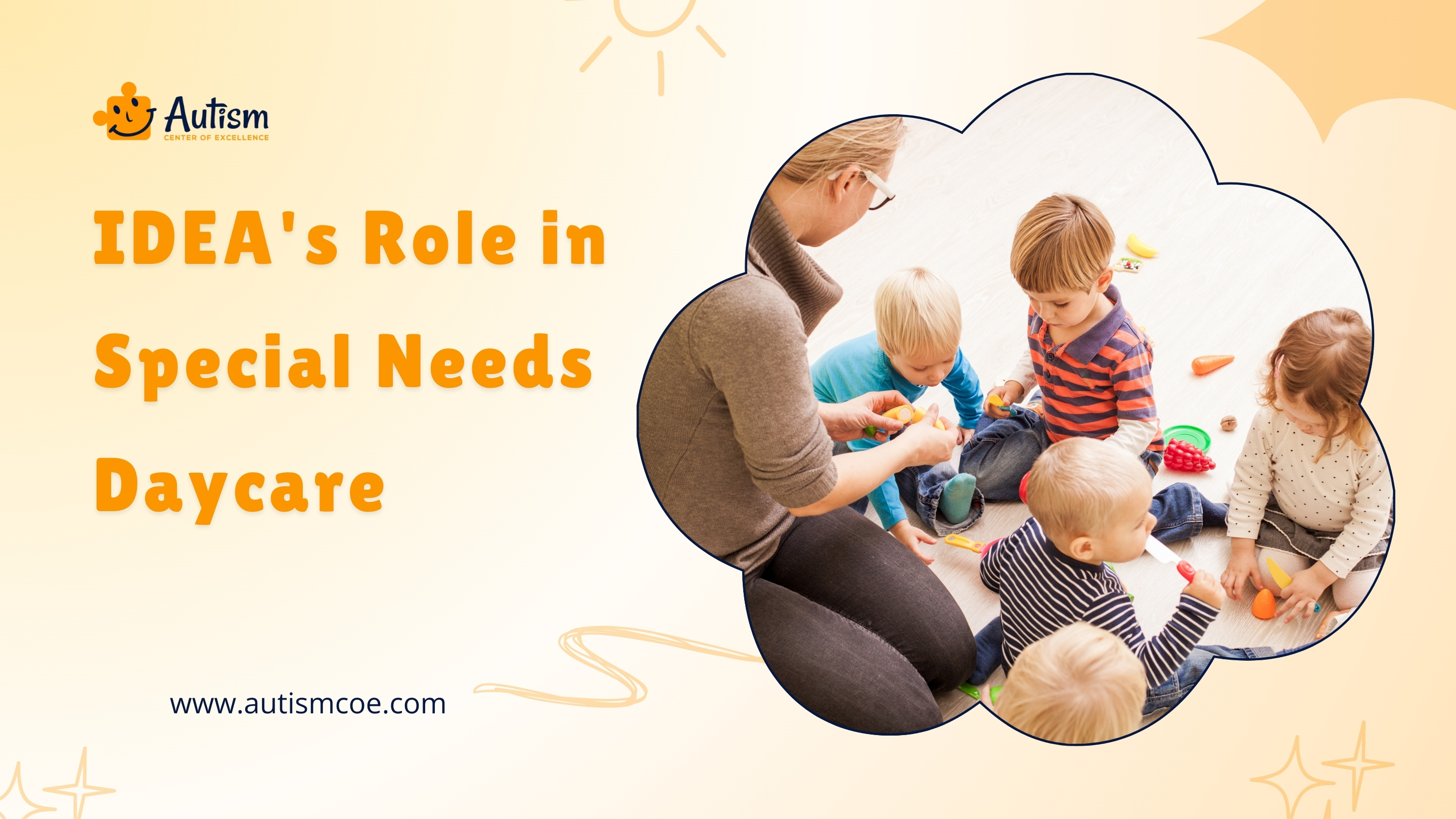
The Role of IDEA in Special Needs Daycare
The Individuals with Disabilities Education Act (IDEA) is like a superhero sidekick for children with special needs. It sets the rules to make sure every child gets the chance to learn and grow, regardless of their abilities. For special needs daycare centers, IDEA has a significant role to play as it guarantees toddlers the right support and early intervention services they deserve.
One of the coolest things about IDEA is that it promotes Inclusive Education. IDEA ensures that if a child is going to have a problem, it must be detected at an early stage, and assistance must be given to tackle the problem. This might involve Speech Therapy, occupational therapy, or tutoring, all of which are intended to assist children in achieving developmental milestones and becoming self-reliant.
IDEA assists in giving daycare early intervention and inclusion to make sure that each child is welcome and appreciated. What’s important here is that all children are prepared for the great adventure of learning and growing and that daycare is a place where each child can thrive.
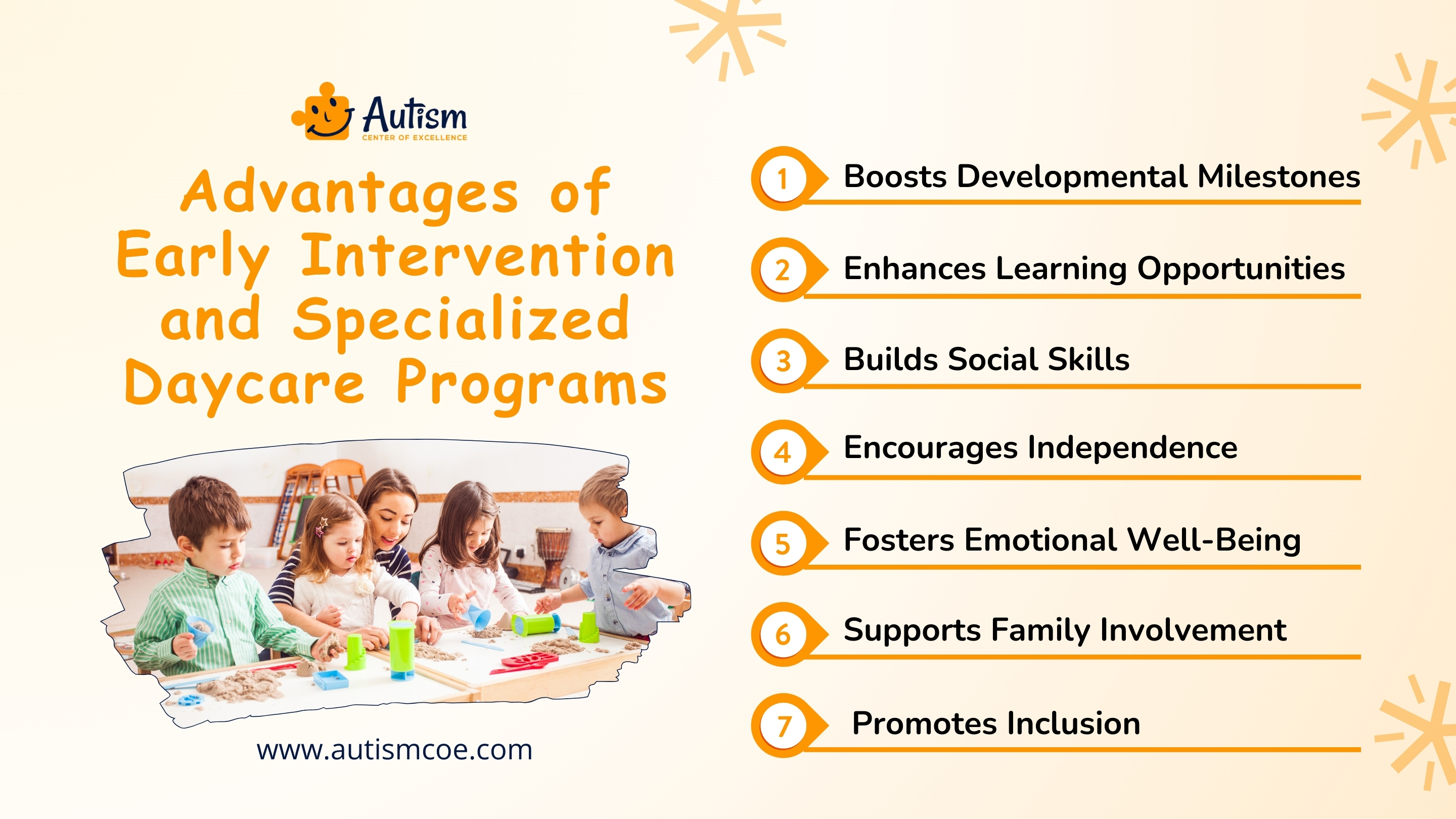
Benefits of Early Intervention and Specialized Daycare Services
Let’s explore how specialized daycare support can enhance the well-being of children with autism.
Boosts Developmental Milestones
Special Education for Children assists them in achieving significant developmental goals through carefully selected interventions and activities.
Enhances Learning Opportunities
Personalized daycare providers provide learning activities that are unique in ability and fun for the children to learn.
Builds Social Skills
Interacting with peers in a supportive environment helps children develop vital social skills, such as communication and sharing, preparing them for future friendships.
Encourages Independence
When children receive individual attention, they develop their self-esteem, and they are able to handle tasks by themselves, hence gaining independence.
Fosters Emotional Well-Being
A quality daycare environment takes care of a child’s emotional needs and needs to make the child feel wanted and understood, which is important for the child’s well-being.
Supports Family Involvement
By working closely with families, early intervention and specialized daycares ensure that parents feel empowered and involved in their child’s development journey.
Promotes Inclusion
These services foster integration and allow all children with or without disabilities to mix and learn or play together in acceptance of each other.
Frequently Asked Questions & Answer
How Do Special Needs Daycare Staff Integrate Early Intervention?
They work with specialists to create personalized care plans and provide targeted support during daily activities.
Do Autistic Kids Do Well in Daycare?
Yes, with the right support and accommodations, many autistic children thrive in daycare by developing social and learning skills.
How to Get an Autistic Child to Nap at Daycare?
Create a consistent nap routine, use calming activities, and provide sensory-friendly spaces to help the child relax.
How to Find Daycare for Autistic Child?
Look for daycares with trained staff, a low child-to-teacher ratio, and sensory-friendly environments. Consider recommendations from local autism organizations.
Conclusion
Enhancing special needs daycare through early intervention is a process of sowing seeds in a garden so that every child has the opportunity to blossom. We have looked at the significance of these daycares in meeting the individual needs of the children and offering them the care they deserve to get to the next Developmental Stages.
It has come as a revelation to see how toddlers can develop important skills, gain confidence, and have a more joyful and integrated daycare experience when they receive early intervention and specific services.
With the right support and intervention, daycares for special needs can truly become magical places where every child is encouraged to explore their potential and celebrate their unique abilities. Remember, when we invest in our children’s early years, we’re paving the way for a brighter, more inclusive future for everyone.
Please Note: The content of this blog is for informational purposes only and should not be considered a substitute for professional medical advice, diagnosis, or treatment. Consult a qualified healthcare professional for personalized guidance tailored to your specific situation.

Bhavika Bhasin
Bhavika Bhasin is the Research and Marketing officer at AutismCOE. She works with children and adults with ASD. Her clinical research includes evaluating various available autism screening and diagnosis methods and their efficacy. She is currently developing a novel screening exam that is indicated to be more accurate than the existing available exams. She is also writes articles papers for various publications.

